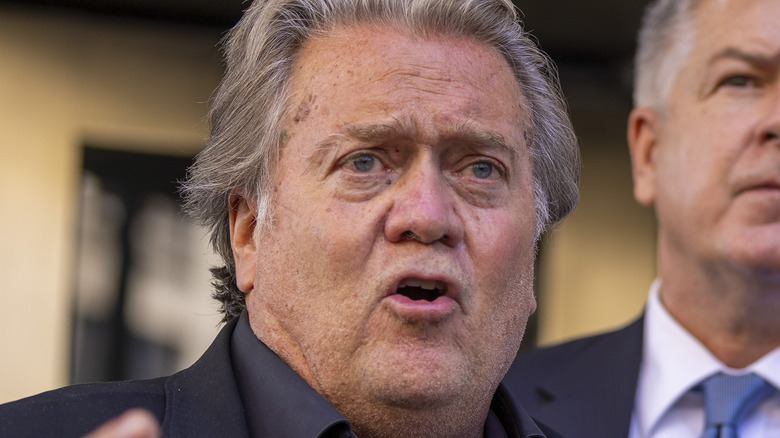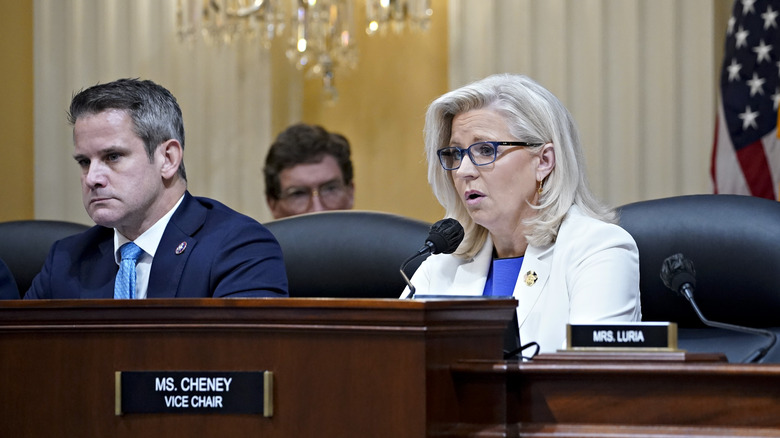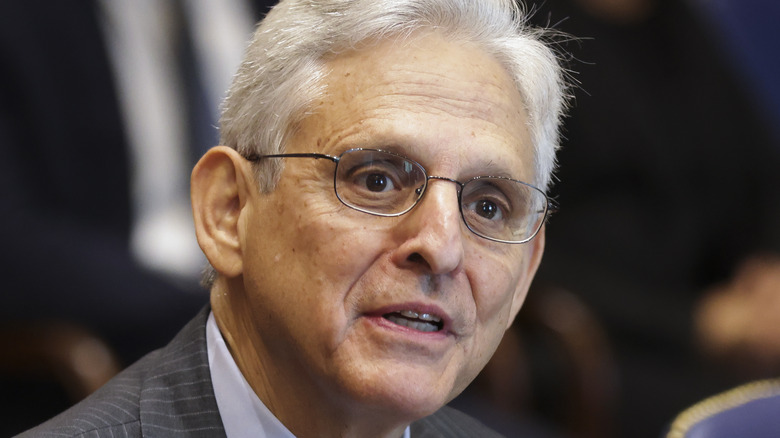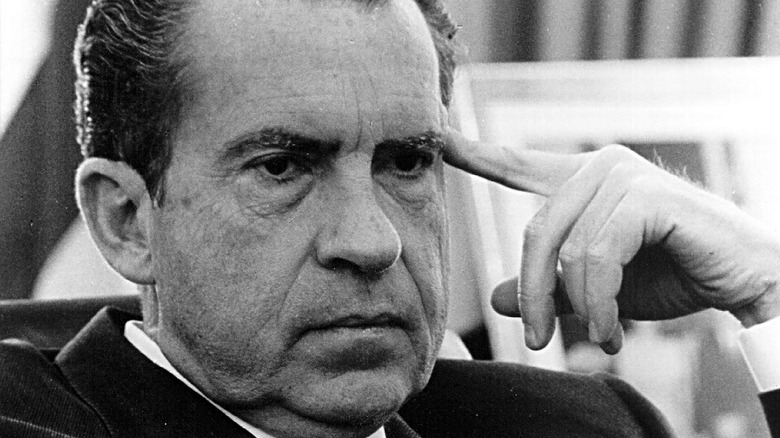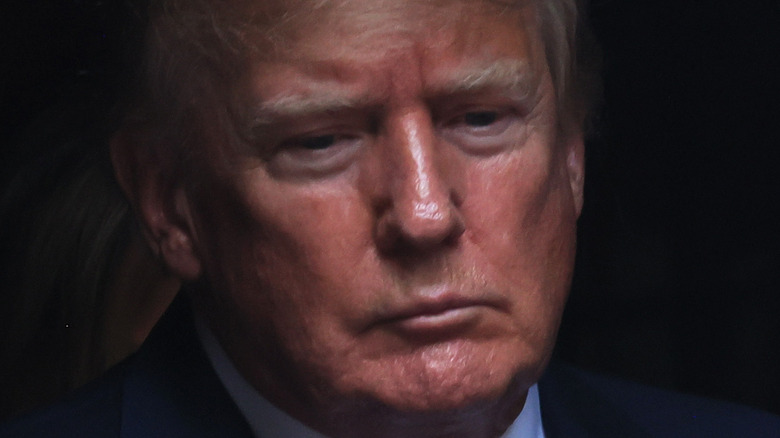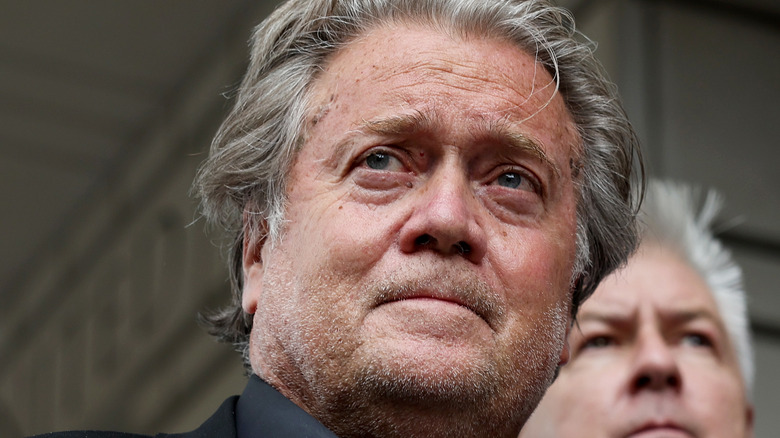Contempt Of Congress Explained
Former Trump advisor Steve Bannon was found guilty by a federal jury on two charges of contempt of Congress, per the Department of Justice. Those charges were filed after Bannon failed to comply with a subpoena from the House select committee investigating the January 6 insurrection in the U.S. Capitol. What does it mean, though, to be charged with contempt of Congress, what possible penalties might Bannon face now that he's convicted, and how and by whom were these charges brought? The answers to those questions relate to the separation of powers at the foundation of American politics, according to Northeastern University.
Those same House proceedings have brought forth a flurry of similar contempt charges against a number of individuals in the former president's inner circle, including one-time Trump chief of staff Mark Meadows. The Department of Justice declined to pursue charges against Meadows, as Politico notes. Those House hearings seek to ascertain what role Trump had in the January 6 Capitol riot during which his supporters allegedly tried to overturn the results of the 2020 presidential election. Five people died and 140 people were injured in the incident, per ABC News.
Contempt of Congress is a misdemeanor
According to The Washington Post, an individual convicted by the Department of Justice on charges of contempt of Congress is guilty of a misdemeanor. The January 6th House committee is led by Illinois Republican Representative Adam Kinzinger and vice-chair Wyoming Republican Representative Liz Cheney. The purpose of contempt of Congress charges, such as what was brought against Bannon, is twofold: to penalize an individual who fails to appear for testimony or who withholds relevant evidence or documents pertinent to Congressional proceedings. Contempt is also meant to deter other individuals from flouting the demands of Congress in similar contexts.
It's important to note that these Congressional powers are limited. Congress contempt charges may not violate the 5th Amendment, which outlines protections against self-incrimination in testimony, per the Bill of Rights. Congress also may not recommend someone be held in contempt for withholding testimony or evidence deemed personal or not relevant to the legislative process at hand. Also ineligible is testimony and evidence on topics over which Congress has no power, as Cornell Law School states.
Congress can only recommend contempt charges
Crucially, the U.S. Congress can only recommend the Department of Justice bring contempt charges against individuals such as Mark Meadows and Steve Bannon. As of this report, the Department of Justice is under U.S. Attorney General Merrick Garland, appointed by President Joe Biden. The role of Congress is to make laws but enforcement is handled elsewhere. For this reason, it's reasonable for Congress to gather all relevant evidence to wield some power to compel individuals to comply with the process. Congress also has the right to penalize those who stand in the way or obstruct their proceedings, as Northeastern University goes on to note.
Those powers were granted to Congress through a Congressional statute passed in 1857, as Constitution Center explains. The issue then rests with the Department of Justice as to whether to try the case before a federal jury. Congress may also bring forth a lawsuit through which they seek to force individuals to comply with a Congressional subpoena in a court of law. Up through the early 20th century, Congress also both brought forth and enforced contempt charges entirely under their purview. None of these powers of Congress are outlined in the Constitution, but they have been affirmed by the U.S. Supreme Court in several rulings (via Constitution Center).
Executive privilege and contempt of Congress
Also curbing Congressional power in this arena is so-called executive privilege. Nowhere is executive privilege mentioned in the Constitution, but the notion that some level of confidentiality must be maintained and is reasonable for a president to expect from their advisors has been tested many times throughout U.S. history with mixed results. Most notably, by then President Nixon in the 1974 Watergate scandal, according to The Washington Post.
At that time, President Nixon claimed that confidentiality in presidential communication was sacrosanct, though the Supreme Court thought differently. In regards to the January 6 House hearings, Bannon's defense at first claimed executive privilege relating to his contempt of Congress. As merely an advisor to Donald Trump, that point was not ruled relevant in Bannon's indictment, according to CNN. Moreover, President Joe Biden holds office while the House committee hearings take place and Bannon has no part in that administration, as Northeastern University points out.
The role of politics in contempt of Congress
As previously stated, once a contempt of Congress charge is recommended the issue then resides with the Department of Justice under the Federal Executive Branch. For this reason, contempt charges are sometimes declined by the DOJ depending on the administration in office, particularly if the investigation in question relates to the dealings of the president in power, as Northeastern's School of Law dean Jeremy R. Paul, told Northeastern University News.
According to Paul, what makes the January 6 committee contempt charges interesting, is that if they had happened in 2017, while Trump was in office, "the case would have been referred to Trump's administration and they'd be very unlikely to move forward with contempt proceedings against their own officials," Paul said. The January 6 hearings also reflect the deep political polarization in the country, Paul adds. In their recommendation to charge Bannon with contempt the House committee said (via CNN) "Mr. Bannon appears to have played a multi-faceted role in the events of January 6th, and the American people are entitled to hear his first-hand testimony regarding his actions."
What's next for Steve Bannon
Several subpoenas were issued in lead-up to the January 6 committee hearings. Bannon's defense claimed the subpoena deadline was unclear, and that the subpoena was improperly issued, among other points. As of this report, Bannon is scheduled to be sentenced for his contempt of Congress conviction on October 21, 2022, according to the Department of Justice. He faces 30 days to up to one year in jail per count of contempt, and fines ranging from $100 to $100,000.
Bannon is also expected to appeal his conviction, according to The Hill, at which time executive privilege may once more be a factor. His defense also claims that the incendiary words used on social media from Bannon's accounts may not, in fact, be his language. Bannon used similar language on his podcast. As far as former Chief of Staff Mark Meadows, who the DOJ declined to charge with contempt, some level of executive privilege was recognized. Meadows did not testify before the committee, but he did turn over text messages (per Politico).
